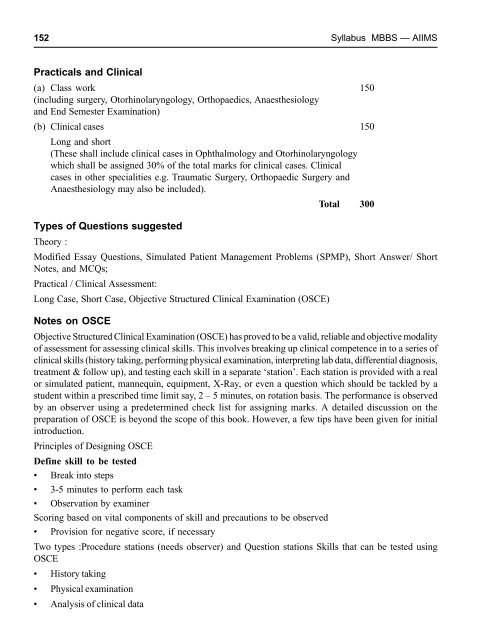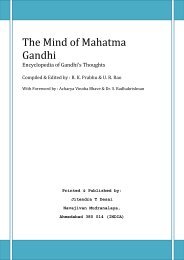Syllabus - MBBS
You also want an ePaper? Increase the reach of your titles
YUMPU automatically turns print PDFs into web optimized ePapers that Google loves.
152 <strong>Syllabus</strong> <strong>MBBS</strong> — AIIMS<br />
Practicals and Clinical<br />
(a) Class work 150<br />
(including surgery, Otorhinolaryngology, Orthopaedics, Anaesthesiology<br />
and End Semester Examination)<br />
(b) Clinical cases 150<br />
Long and short<br />
(These shall include clinical cases in Ophthalmology and Otorhinolaryngology<br />
which shall be assigned 30% of the total marks for clinical cases. Clinical<br />
cases in other specialities e.g. Traumatic Surgery, Orthopaedic Surgery and<br />
Anaesthesiology may also be included).<br />
Total 300<br />
Types of Questions suggested<br />
Theory :<br />
Modified Essay Questions, Simulated Patient Management Problems (SPMP), Short Answer/ Short<br />
Notes, and MCQs;<br />
Practical / Clinical Assessment:<br />
Long Case, Short Case, Objective Structured Clinical Examination (OSCE)<br />
Notes on OSCE<br />
Objective Structured Clinical Examination (OSCE) has proved to be a valid, reliable and objective modality<br />
of assessment for assessing clinical skills. This involves breaking up clinical competence in to a series of<br />
clinical skills (history taking, performing physical examination, interpreting lab data, differential diagnosis,<br />
treatment & follow up), and testing each skill in a separate ‘station’. Each station is provided with a real<br />
or simulated patient, mannequin, equipment, X-Ray, or even a question which should be tackled by a<br />
student within a prescribed time limit say, 2 – 5 minutes, on rotation basis. The performance is observed<br />
by an observer using a predetermined check list for assigning marks. A detailed discussion on the<br />
preparation of OSCE is beyond the scope of this book. However, a few tips have been given for initial<br />
introduction.<br />
Principles of Designing OSCE<br />
Define skill to be tested<br />
• Break into steps<br />
• 3-5 minutes to perform each task<br />
• Observation by examiner<br />
Scoring based on vital components of skill and precautions to be observed<br />
• Provision for negative score, if necessary<br />
Two types :Procedure stations (needs observer) and Question stations Skills that can be tested using<br />
OSCE<br />
• History taking<br />
• Physical examination<br />
• Analysis of clinical data



